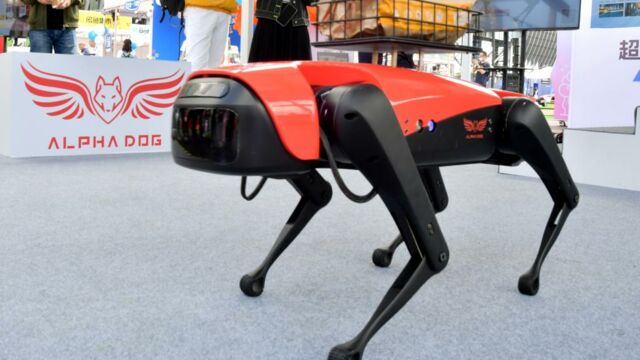The high-tech doggie, equipped with detectors, runs on an artificial intelligence, which allows it to 'hear' and 'see' its environment. But you can also take it for a walk. With neither tail nor head, Alphadog nonetheless is still 'just like a real dog,' summarizes Ma Jie, technology manager at Weilan, the Nanjing company behind the prototype.
Discover our latest podcast
Flirting with some 15 km/hour as a top speed, AlphaDog also claims the world racing record for a metallic animal. It is also more stable than a real dog, explain its designers, with a great kick in the hindquarters as a demonstration. Unlike a common remote-controlled pooch, the four-legged robot moves freely in its environment using 5G mobile internet, with lightning-fast response time. 'It detects the ground's level and friction in order to adapt its height and the speed of its steps,' explains Ma Jie, while the demonstrator robot slowly but surely begins to climb a staircase.
Well-behaved doggies
It was at Oxford that Ma Jie studied reinforcement learning, an artificial intelligence technique that 'trains' robots through rewards or punishment, in an eerie parallel to the Pavlovian conditioning method used on real dogs. They have used this reinforcement technique to program the robot based on canine behaviour. AlphaDog reconciles two well-loved idiosyncrasies in today's China: technology and pets. The latter had disappeared from the public space in the first decades of the communist regime but have made a comeback in the last 20 years.
As a result, more than 1,800 AlphaDogs were sold as of their first month on the market, for the tidy sum of 16,000 yuan (1,800 pounds) each.
Orders come mainly from computer developers, geeks, but also children, who really seem to love it.
Future guide dog
While Beijing is heavily investing in new technologies, particularly artificial intelligence, robots are already present in the landscape as parcel deliverers, waiters in restaurants or even those responsible for COVID-19 screening tests. Ultimately, the creators of the Chinese robodog intend to put it in service of the blind.
When it'll also have the dialogue function, it will be able to communicate with the disabled and take them to the supermarket or to the bus stop.
For the 'business' package, a larger AlphaDog can be used in the inspection of industrial machines or pipes. The next generation could also have the robot endowed with a 'personality' of the customer's choice.















